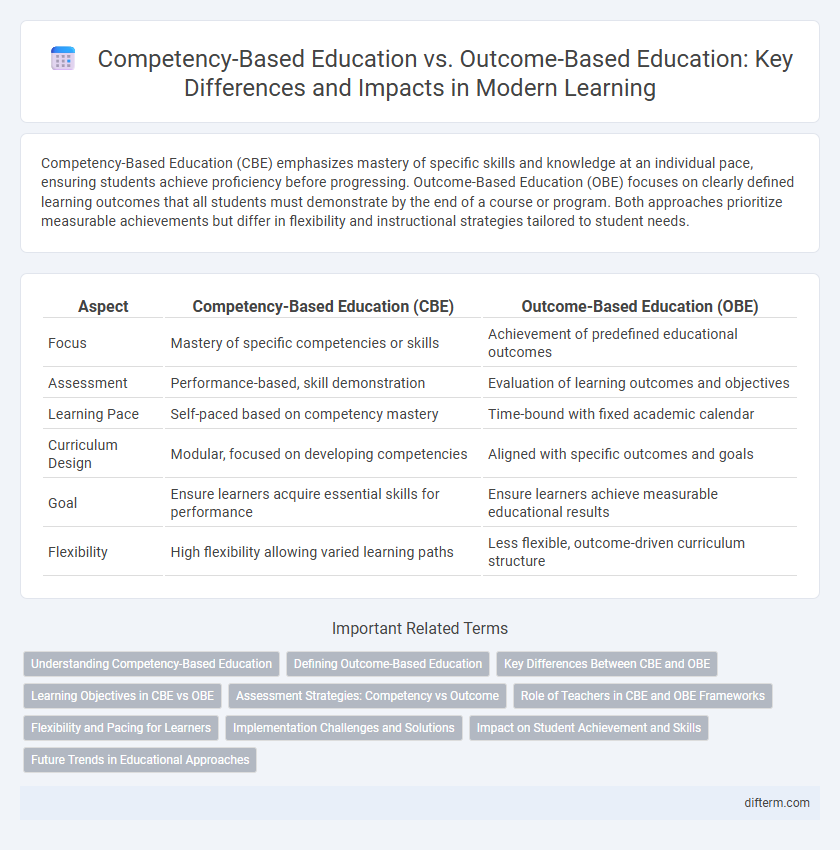Competency-Based Education (CBE) emphasizes mastery of specific skills and knowledge at an individual pace, ensuring students achieve proficiency before progressing. Outcome-Based Education (OBE) focuses on clearly defined learning outcomes that all students must demonstrate by the end of a course or program. Both approaches prioritize measurable achievements but differ in flexibility and instructional strategies tailored to student needs.
Table of Comparison
| Aspect | Competency-Based Education (CBE) | Outcome-Based Education (OBE) |
|---|---|---|
| Focus | Mastery of specific competencies or skills | Achievement of predefined educational outcomes |
| Assessment | Performance-based, skill demonstration | Evaluation of learning outcomes and objectives |
| Learning Pace | Self-paced based on competency mastery | Time-bound with fixed academic calendar |
| Curriculum Design | Modular, focused on developing competencies | Aligned with specific outcomes and goals |
| Goal | Ensure learners acquire essential skills for performance | Ensure learners achieve measurable educational results |
| Flexibility | High flexibility allowing varied learning paths | Less flexible, outcome-driven curriculum structure |
Understanding Competency-Based Education
Competency-Based Education (CBE) emphasizes the mastery of specific skills and knowledge, allowing learners to progress at their own pace until achieving defined competencies. CBE integrates personalized learning pathways and continuous assessments to ensure practical application and readiness for real-world challenges. Unlike Outcome-Based Education (OBE), which focuses broadly on end goals, CBE prioritizes demonstrable expertise and learner-centered progress tracking.
Defining Outcome-Based Education
Outcome-Based Education (OBE) is an instructional approach that emphasizes the achievement of specific, measurable learning outcomes by students upon completion of a course or program. It prioritizes defining clear educational goals that guide curriculum design, teaching methods, and assessment strategies to ensure all students meet the desired competencies. OBE contrasts with Competency-Based Education by focusing more broadly on end results and overall performance, rather than solely on mastering individual skills or competencies.
Key Differences Between CBE and OBE
Competency-Based Education (CBE) centers on students demonstrating specific skills and knowledge at their own pace, emphasizing mastery of defined competencies for progression. Outcome-Based Education (OBE) aims to ensure all learners achieve predetermined educational outcomes, focusing on the results of the learning process rather than the methods or time taken. Key differences include CBE's personalized pacing and skill mastery contrast with OBE's uniform achievement of learning outcomes across all students.
Learning Objectives in CBE vs OBE
Competency-Based Education (CBE) emphasizes mastering specific skills and knowledge, with learning objectives tailored to measurable competencies that students must demonstrate at their own pace. Outcome-Based Education (OBE) focuses on broader educational outcomes, defining learning objectives aligned with desired end results or performance levels expected after course completion. Both frameworks prioritize clear learning objectives, but CBE targets individualized competence, whereas OBE centers on standardized outcomes for all learners.
Assessment Strategies: Competency vs Outcome
Competency-Based Education (CBE) assessment strategies emphasize continuous evaluation of specific skills and abilities through practical tasks, allowing learners to demonstrate mastery at their own pace. Outcome-Based Education (OBE) assessments focus on measuring whether students achieve predetermined learning outcomes, often using standardized tests and final evaluations. Both approaches prioritize measurable results but differ in flexibility and assessment frequency to validate student performance.
Role of Teachers in CBE and OBE Frameworks
Teachers in Competency-Based Education (CBE) serve as facilitators guiding students through personalized learning paths, emphasizing mastery of specific skills and competencies at an individualized pace. In Outcome-Based Education (OBE), educators focus on aligning instruction to clearly defined learning outcomes, ensuring all students achieve predetermined academic goals through continuous assessment. Both frameworks require teachers to adapt instructional strategies to support student-centric learning but differ in the emphasis on skill mastery versus meeting uniform educational results.
Flexibility and Pacing for Learners
Competency-Based Education (CBE) allows learners to progress at their own pace by demonstrating mastery of specific skills, offering high flexibility tailored to individual learning needs. Outcome-Based Education (OBE) emphasizes achieving predefined learning outcomes within a set timeframe, potentially limiting pacing flexibility but ensuring consistent achievement standards. CBE's personalized progression contrasts with OBE's structured timeline, impacting learner autonomy and adaptability in educational settings.
Implementation Challenges and Solutions
Competency-Based Education (CBE) and Outcome-Based Education (OBE) face implementation challenges such as aligning curriculum design with measurable skills and managing diverse learner paces. Integrating robust assessment tools like digital portfolios and adaptive testing platforms addresses the difficulty in accurately tracking student mastery and progression. Professional development for educators on competency frameworks and continuous feedback loops enhances effective deployment and learner engagement in both CBE and OBE systems.
Impact on Student Achievement and Skills
Competency-Based Education (CBE) enhances student achievement by allowing learners to progress at their own pace, mastering specific skills before moving forward, which leads to deeper understanding and retention. Outcome-Based Education (OBE) emphasizes measurable results and standardized achievement levels, ensuring that all students meet defined benchmarks but may overlook individual learning speeds. Both approaches improve skill acquisition, but CBE's personalized learning path often results in higher engagement and more effective mastery of critical competencies.
Future Trends in Educational Approaches
Future trends in educational approaches emphasize the integration of Competency-Based Education (CBE) and Outcome-Based Education (OBE) to tailor learning experiences that prioritize mastery of specific skills and measurable results. Advances in technology facilitate personalized learning pathways, enabling real-time assessment and adaptive feedback aligned with industry demands. Increasing adoption of competency and outcome-oriented frameworks prepares students for dynamic job markets by linking education directly to employability and lifelong learning.
Competency-Based Education vs Outcome-Based Education Infographic

 difterm.com
difterm.com